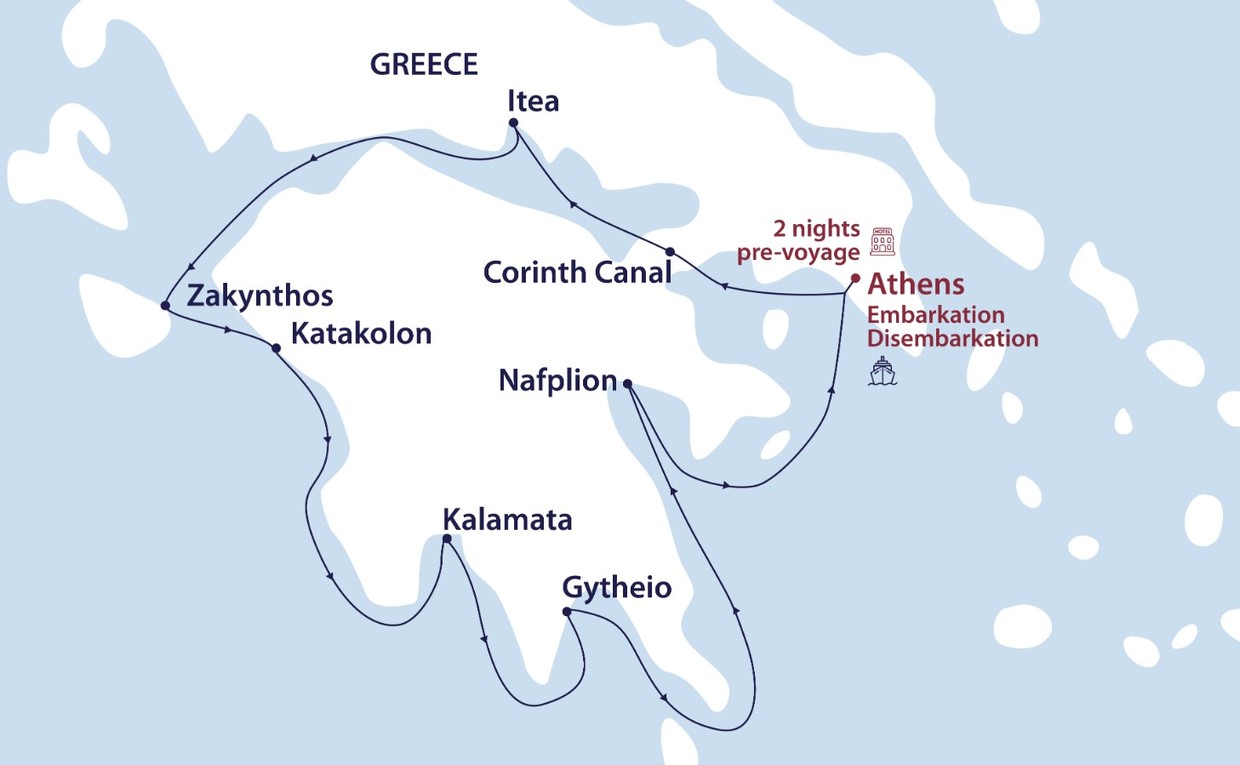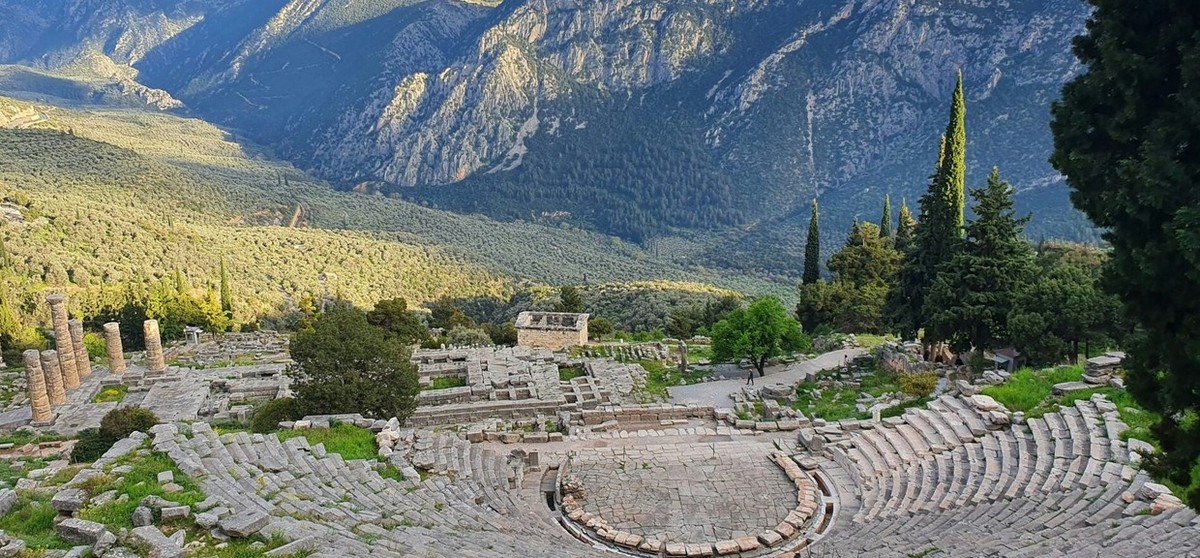
Welcome to Aurora Expeditions’ To Antiquity and Beyond
This classic voyage explores the fabled Peloponnese peninsula, where every step resonates with the echoes of ancient tales and timeless wonders. Here, in the rugged beauty of craggy coves and olive-grove-dotted hillsides, the mythical tales of Helen of Troy, Heracles, and Hercules come to life amid the haunting ruins of Sparta, Olympia and Argolis.
As we wander through the classical temple complexes of Olympia, marvel at intricate Byzantine mosaics at Myras, and stand in awe before the stoic Venetian fortress at Monemvasia, we immerse ourselves in the history that defines this sacred land. From the cradle of democracy to the birthplace of philosophy, every corner holds a narrative of the civilisations that have shaped human thought. Amid this timeless landscape ‒ where time itself seems to pause ‒ ancient villages beckon, each whispering tales of bygone eras and sacred rituals. It is a realm that invites exploration of the very essence of Greek heritage and culture, where the past intertwines seamlessly with the present. For in the Peloponnese, history is not merely a chapter in a book ‒ it is a living, breathing testament to the enduring spirit of humanity, one that we invite you to embrace as we journey through antiquity and beyond.
- Visit the ancient UNESCO sites of Olympia, Delphi, and Mycenae, where civilisation’s foundations were laid and classical myths were born
- Sail the engineering marvel of the Corinth Canal, a dramatic passage connecting Corinth to the Aegean Sea
- Discover Epidaurus, Messini, Pylos and Monemvasia, with timeless tales of heroes, gods, and olympians
- Taste Greece’s legacy and explore olive oil production in Kalamata, local ouzo in Nafplio and wine in Zayknthos
- Start your journey in Athens at the Acropolis and Agora, Plaka and Syntagma Square
Prices quoted here are often dependent on currency fluctuations. Please check with (01432 507450 or info@small-cruise-ships.com) for the very latest price, which may well be cheaper than the one advertised here.

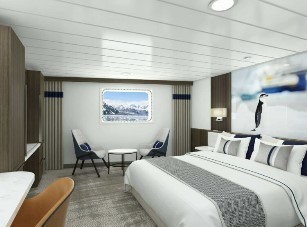
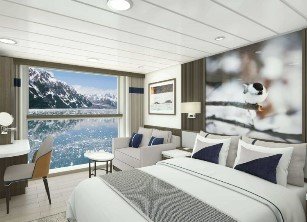
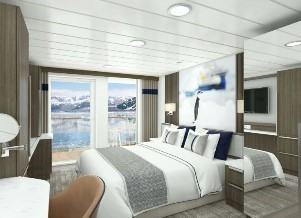
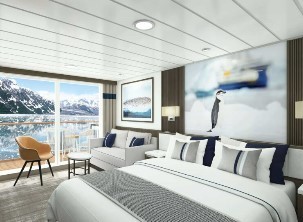
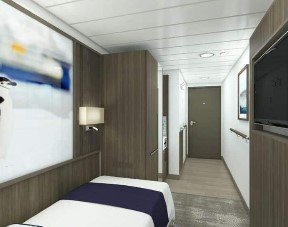
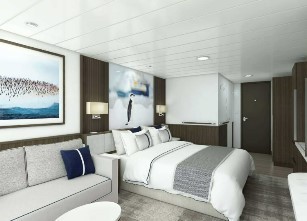
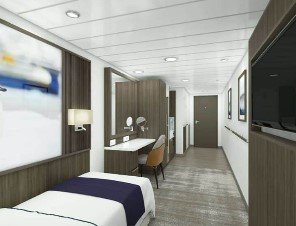
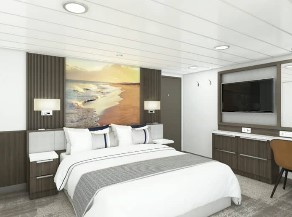
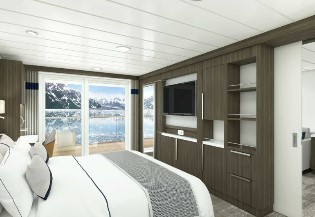
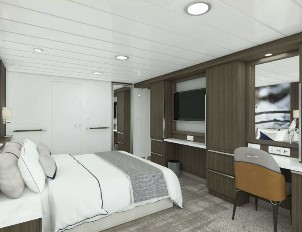
Welcome to Athens. On arrival at Athens airport make your way to the Arrivals Hall to meet our representative, followed by a transfer to our group hotel. At the hotel, visit our hospitality desk in the lobby to meet our team who will provide you with useful information regarding pre-embarkation procedures and about your time in Athens.
You will also receive cabin tags for your luggage. Please clearly label the tags with your name and your cabin number on the ship. This evening offers time to relax in preparation for tomorrow.
Accommodation: Athens Hotel
After breakfast, enjoy a morning ‘Your Choice’ experience. Walk in Socrates' footsteps, explore the ancient wonders of the Acropolis, or immerse yourself in Athens' vibrant food scene with a local guide. You can then rejoin the coach to return to our hotel or take a leisurely stroll to the nearby Plaka district. This charming area is filled with streets and alleys lined with restaurants, cafes, and shops—ideal for a bite to eat or picking up gifts (lunch at your own expense). Tonight, we kick off our journey with a Welcome Event, celebrating Greek style.
With a rich recorded history spanning 3,500 years, Athens is a city brimming with stories. Widely hailed as the ‘cradle of civilisation’ and revered as the birthplace of democracy, philosophy and theatre, Athens seamlessly merges its illustrious past with its vibrant present. This bustling metropolis, home to three million inhabitants, is adorned with a wealth of ancient sites that punctuate its landscape like temples, iconic columns and former city centres. Athens’ influence in antiquity transcended its borders, ushering in a Golden Age characterised by political discussion, education and philosophy, hosting luminaries such as Socrates, Plato and Aristotle. The democratic principles forged in Athens laid the groundwork for modern governance systems worldwide.
Yet, Athens is more than just a relic of ancient history. As a historical seat of power, it has weathered waves of invasions, shaping its contemporary identity with a diverse fusion of architectural styles, culinary delights and cultural traditions. Whether you are wandering amid ancient ruins or indulging in the flavours of modern Greek cuisine, Athens offers a captivating journey through the ages, beckoning travellers from across the globe to explore its timeless allure.
Personalise your exploration with our included ‘Your Choice’ experiences.
Option 1 – Morning experience: A Taste of Athens
For foodie fans, travellers who have visited Athens before, and those who enjoy a personal view of Athens, this experience is perfect. We begin our guided walk at Syntagma Square, where Greece’s Parliament building stands, guarded by traditionally attired Evzone guards. Our local expert warmly welcomes you to their home city, leading you on an intriguing walking tour through Athens’ historical areas. With passion and knowledge, they unveil authentic Athens and its secrets.
Stroll through Plaka, the charming ‘old quarter’ of Athens nestled at the base of the Acropolis. Admire its eclectic neoclassical architecture, picturesque alleys, and inviting tavernas. Pause at a colourful local cafe to indulge in Greek delicacies such as olives, fragrant cheeses and cured meats.
Continue through Monastir Aki, famous for its bustling flea market and vibrant shops brimming with local crafts and souvenirs. From there, we wander to Thission, offering the best panoramic views of the Acropolis, Ancient Agora, and the majestic Temple of Hephaestus. Here, we treat ourselves to a traditional Greek coffee, accompanied perhaps by a sweet delight like baklava, a favourite among Greeks for its rich layers of pastry, nuts and honey. Our morning offers us a taste of this fascinating city.
Option 2 – Morning experience: Ancient Athens
This comprehensive tour combines a visit to the Acropolis with the city’s major landmarks. Begin with a view of the Greek parliament at Syntagma Square, once a royal residence, where the iconic Evzones still stand guard in traditional attire. Next, enjoy a brief photo stop at the Panathenaic Stadium, the site of the first modern Olympic Games in 1896, where athletes revived the ancient Olympic spirit.
Perched high above the city, the Acropolis is not only an architectural marvel, but also a symbol of the birthplace of democracy. This ancient citadel stands as a testament to the enduring legacy of Greek culture and ideals, representing advancements in art, architecture and political thought that originated in Athens. Feel the essence of civic pride and religious devotion in ancient Greek society, at the city’s centre for political and cultural life. The Parthenon exemplifies the height of classical Greek architecture, adorned with Doric columns and intricate sculptures. Built under the leadership of Pericles, the Parthenon symbolised the city’s wealth and power, with friezes and statues depicting various mythological scenes.
After touring the Acropolis, take a short walk to the Acropolis Museum. This modern museum houses over 3,000 artefacts from the Athenian Acropolis, offering unique insights into ancient Greek life and including an archaeological excavation beneath it. (Note: Entrance time to the Acropolis is a local government stipulated time slot. The sequence of the above itinerary may change once the specific time slot is allocated.)
Option 3 – Morning experience: ‘In the Sandal prints of Socrates’
Blending philosophy with the rich history of Athens', ‘In the Sandals of Socrates’ is the ultimate walking tour of the city. Our journey begins at the hilltop agora, where Athenians once gathered to freely express their opinions and debate issues of the day. Ancient Greece birthed Western philosophical ethics, thanks to Socrates, Plato and Aristotle, ensuring its place in history. Next, we head to Philopappos Hill, a significant place in the life of Socrates. Here, you’ll find the prison where he was held for corrupting the youth of Athens, and the Pnyx, the birthplace of democratic ideals. The view of the Acropolis from the hilltop is stunning.
Strolling down a pedestrian street lined with cafes and vendors, we make our way to Hadrian’s Arch and the Temple of Olympian Zeus. Our walk continues to the Lyceum, Aristotle’s school, passing by the National Garden and Zappeion Hall. The tour concludes at the Lyceum, excavated and opened to the public in 2014. Here, we walk in the footsteps of great philosophers, linking ancient and modern Athens in this fascinating journey.
Accommodation: Athens Hotel
Meals: Breakfast, Welcome Event canapés
Enjoy a leisurely morning in Athens. Revisit your favourite sites, explore the city’s markets and shops, or discover hidden treasures on an independent exploration. Athens’ extensive metro network makes it easy to navigate the city, while the warm Greek hospitality ensures you are never far from helpful advice on how to make the most of your time.
Mid-afternoon, we transfer from our hotel to the port of Piraeus to board the Douglas Mawson and sail towards the famed island of Mykonos. This evening, we enjoy a ‘Welcome Aboard’ dinner where we meet our crew and Aurora Expeditions team.
Sailing the Corinth Canal is a unique experience. This narrow waterway connects the Gulf of Corinth with the Saronic Gulf in the Aegean Sea, cutting through the Isthmus of Corinth and saving vessels a significant 700-kilometre journey around the Peloponnese peninsula. Stretching 6.4 kilometres and only 21 metres wide at its base, the Corinth Canal is one of the narrowest lock-free canals in the world. Its towering limestone walls, reaching heights of up to 78 metres, create a dramatic passage for vessels, which almost touch its sides as they sail its path.
The concept of cutting a canal through the isthmus dates to ancient times, with plans proposed by Periander of Corinth in the 7th century BCE. Construction finally began under Roman Emperor Nero, only to halt upon his death. It was not until 1893 the canal was finally completed. Its construction was a monumental effort, involving the excavation of millions of cubic metres of earth and rock, all dug at sea level. It stands as a remarkable achievement in engineering and continues to be a key route for maritime traffic, enhancing Greece’s role as a central hub in the Mediterranean.
Exiting the canal, we sail the Gulf of Corinth to Itea where our afternoon offers a glimpse into the life of the early Greeks, with a visit to the former city of Delphi. Our local guides tell tales of pilgrimage, sacrifice and early faiths as we take a literal step into the world of ancient Greece.
Revered throughout antiquity as a sacred site where pilgrims could glimpse the future, the Oracle of Delphi cast cryptic prophecies for over a millennium. Dubbed the ‘navel of the world’ for its pivotal position in the Greek realm, Delphi drew pilgrims from all sectors of society, shaping critical decisions, from civic politics to personal destinies. Perched dramatically on the slopes of Mount Parnassus, the Oracle was esteemed as a direct conduit to the divine realm of Apollo – the sun god. Revered for his beauty and creative prowess, Apollo symbolised order and harmony. As a result, Delphi became integral to Greek identity, reflecting its religious, cultural, and political life. It was a unifying site where people from various city-states gathered, fostering a sense of shared Hellenic heritage.
Our journey leads us to the very site of the Oracle, alongside the opulent Treasury of the Athenians – a testament to offerings made. We pause at the ancient theatre, host to the prestigious Pythian Games, and the Castalian Spring, where pilgrims purified themselves before seeking counsel.
Today, Delphi stands as a UNESCO World Heritage Site, its influence enduring through the annals of literature, history, and art. It remains a profound emblem of ancient wisdom and cultural legacy, cherished by Greece as a bridge to its storied past.
The tale of Zakynthos unfolds from antiquity, with traces of human habitation dating back to the Neolithic Period. Across the ages, Zakynthos has been moulded by various civilisations, including the ancient Greeks, Romans, Byzantines, Venetians and British, each leaving an indelible imprint on the island’s heritage and architecture.
Among the island’s most iconic landmarks is Navagio Beach, nestled amid towering limestone cliffs and famed for the shipwreck that graces its shores. This secluded cove epitomises Zakynthos’s rugged coastline, where hidden caves, rocky coves and inviting waters beckon exploration.
Zakynthos’s capital city, bearing the same name, showcases elegant Venetian architecture, inviting squares and a vibrant waterfront promenade. Visitors can meander along narrow cobblestone streets, admiring historical edifices adorned with vibrant bougainvillea, and savour traditional Greek delicacies at local tavernas.
Personalise your exploration with our included ‘Your Choice’ experiences.
Option 1 – Morning experience: Zakynthos Farm Experience: A Taste of Local Life
Discover the Greek rural way of life at this organic farm on Zakynthos, set amid lush pine forests and scenic coastal views. The farm’s olive grove reflects a rich tradition of cultivation. Originally home to just nine olive groves, Zakynthos now boasts over 600, thanks to the dedication of local farmers who have blended traditional methods with modern techniques to refine the quality of their olive oil.
In addition to olives, the farm cultivates syrah, cabernet and robola grapes, and maintains beehives that produce fragrant honey. Seasonal fruits such as apricots, figs, cherries, oranges, lemons and mandarins enrich the farm’s offerings. A tour and tasting with a member of the family provides an authentic glimpse into Greek agricultural life, offering an escape from the usual tourist experience and a deeper understanding of Zakynthos’s farming heritage.
Option 2 ‒ Full day experience: Zakynthos complete
Discover the hidden side of Zakynthos as our local guide shares the island’s rich history and culture. The tour begins on the western side, passing through Tsilivi, Planos and Katastari, offering a glimpse of traditional village life. Visit a local winery where experts demonstrate traditional winemaking, allowing you to sample local wines and delicacies. Continuing our scenic drive, we reach the cliffs overlooking the famous Navagio Beach (Shipwreck Beach). Here, you can admire the azure waters and golden sands, as well as the rusted hull of the MV Panagiotis, a freighter that ran aground in 1980 while allegedly smuggling contraband.
We then visit the Monastery of Anafonitria, where Saint Dionysius, the island’s patron, spent the last years of his life. Enjoy a traditional lunch at a local tavern, featuring delicious dishes and local wine. The tour continues to Volimes, one of the island’s oldest villages, renowned for traditional handmade embroidery. We also visit the villages of Exo Chora, Kiliomenos, and Agios Leon. The final stop is Maherado, where we visit the Church of Saint Mavra and hear its fascinating story, before returning to the ship.
Today, our ‘Your Choice’ experiences are truly Olympic in scope, offering you two classic Greek treats. A brief ten-minute walk from our berth, finds a variety of shops and restaurants to explore. Just a short distance away, the popular pebbled Plakes Beach awaits, and the sandy stretch of Agios Andreas Beach is a mere five-minute taxi ride.
Steeped in maritime history, the picturesque port town of Katakolon remains the gateway to the ancient site of Olympia, and our port for today. One of the most important sanctuaries in ancient Greece, Olympia was dedicated to Zeus, the king of the gods. Every four years, athletes from across the Greek world gathered here to compete in various sports, honouring Zeus and fostering unity among the city states. The busy port town of Katakolon itself is a hub of activity, with its quaint streets lined with shops and cafes, while the Katakolon Lighthouse and the Museum of Ancient Greek Technology offer insights into the region’s rich history.
Personalise your exploration with our included ‘Your Choice’ experiences.
Option 1 – Morning experience: An Olympic Encounter
Renowned as the birthplace of the ancient Olympic Games, the 8th-century BCE site of Olympia was the Greek world’s most revered religious sanctuary, dedicated to Zeus, the king of the gods. The site housed numerous temples, altars, and sporting facilities, with the Temple of Zeus featuring a 40-foot statue of Zeus sitting on an elaborate cedarwood throne adorned with ebony, ivory, gold and precious stones. This statue was one of the Seven Wonders of the Ancient World.
Held every four years from 776 BCE to 393 CE, the games at Olympia attracted athletes from all over the Greek world. Over 45,000 spectators cheered on their sporting heroes, who competed in a range of sports such as running, wrestling, boxing, and chariot racing. The games were not only a display of physical prowess, but also a celebration of Greek unity and religious devotion. Victors were awarded olive wreaths and gained immense prestige and honour in their home cities.
Today, Olympia continues to influence the modern Olympic Games. Many of the ancient sports, lost throughout the centuries, were revived in 1896 by Pierre de Coubertin’s ‘Modern Olympics’. The Olympic flame, a symbol of peace and unity, is lit in a ceremony at the ancient site of Olympia before every modern Olympics, and then relayed to the host city. This tradition underscores the connection between the ancient and modern games. A visit to Olympia is a lesson not only in its historical and archaeological importance, but also in its lasting impact on global culture through the ongoing tradition of the Olympic Games. The site fosters a spirit of unity and excellence that resonates nearly 3,000 years after those first games. Our local guide brings the story of Olympia to life with tales of sporting heroes, revered gods, and generations of families who have lived on this land. The museum is a short walk from the site and contains the 4th-century BCE statue of Hermes by Praxiteles, plus several finds from the excavations, including Paeonius’ Nike of Victory, who according to Olympic legend, came down from the heavens to hand a palm leaf to every winner.
Option 2 – Half day experience: Farm and Feast
Nestled among olive trees and vineyards, this 30-acre, family-owned estate lies approximately 45 minutes from the port in the picturesque region of Floka near Ancient Olympia. Embracing traditional farming methods and organic cultivation passed down through generations, the estate exudes a timeless charm. Upon arrival, guests are greeted with a classic shot of ouzo, a beloved Greek spirit celebrated for its distinct anise flavour and potent clarity. Integral to Greek culture, ouzo is often savoured as an aperitif or paired with meze (small dishes).
Accompanying the ouzo is a freshly baked local pie, served as our hosts share insights into the estate’s non-mechanised olive-harvesting techniques. Delve into a captivating history of olive oil and its revered properties, underscoring the profound connection between Greek cuisine and the land. Enjoy a leisurely stroll around the farm, interacting with the resident animals. Later, we gather in the charming stone farmhouse, now transformed into a cosy dining area. Here, indulge in a feast of traditional flavours sourced from the farm and the local area, complemented by the estate’s wine drawn straight from large oak barrels. Our visit culminates in true Greek style with a lively sirtaki dance. Join in the celebration as guests and newfound friends of the estate embrace the joyous spirit of Opa!
Renowned for its famous olives, Kalamata is the capital of the Messenia region. Having withstood the influences of various civilizations—including the Byzantines, Franks, Venetians, and Ottomans—Kalamata invites us to explore a slice of classic Greece on the Peloponnese Peninsula. Today, it serves as our gateway to a coastline dotted with medieval castles and provides an opportunity to savour the local olives. Sampling the renowned black Kalamata olives and picking up a bottle of extra virgin olive oil from a local producer is highly recommended. Many of these producers are small-scale and family-run, offering a genuine experience.
This vibrant harbour city is dominated by a rocky outcrop, which, although formerly a Greek Argos, now hosts the Frankish-built 13th-century Castle of Isabeau. The castle offers dramatic panoramic views across the Messinian Gulf. At its base, the Palia Poli, or Old City, provides an eclectic open-air venue for theatre, music, and dance shows. The city's charm lies in its blend of historical allure and contemporary vibe. It continues to thrive as a centre of agriculture, with its famed almond-shaped olives exported worldwide and locally produced olive oil coveted as a symbol of Greek culinary expertise.
Personalise your exploration with our included ‘Your Choice’ experiences.
Option 1 – Morning experience: Kalamata’s Olives and Ancient Messini
Our morning begins with a journey into the ancient past and present as we explore the ruins of Messini, visit the village of Androusa, and discover the essence of the Kalamata olive. Nestled below the village of Mavromati, the extensive ruins of Messini sprawl across a hillside, comparable in scope to sites like Delphi and Epidavros. Founded around the 4th century BCE, Ancient Messini thrived as a prominent city-state for 350 years under Spartan rule before gaining independence. Explore its expansive theatre and formidable city walls, offering an insight to the city’s former political, cultural, and religious life. Further down the hill, we find a large stadium, surrounded by a forest of restored columns. Invading Romans transformed part of the athletics track into a gladiator arena, complete with VIP seats adorned with lion backs and paw-shaped legs. Nearby, by the rebuilt gate of the immense gymnasium, discover round holes in stone slabs—Roman public toilets ingeniously positioned over a stream.
No visit to Kalamata is complete without a nod to its famed olives. Afterward, immerse yourself in the timeless tradition of olive oil production in Androusa village. Visit a traditional olive mill to observe the meticulous process from olive cultivation to oil extraction, followed by an exclusive tasting session to savour the rich flavours of locally crafted olive oil, celebrated for its quality and distinctive Mediterranean character.
Option 2 – Morning experience: Medieval Methoni and Pylos
Our drive follows the scenic coast for an exploration of two magnificent Venetian castles and their waterfront villages. Methoni Castle, built in the early 13th century on a rocky promontory, ranks among the Mediterranean's largest. It boasts a stone bridge with 14 arches and houses relics of Ottoman bathhouses and immured reliefs. Adjacent is Bourtzi, once a prison during Turkish rule.
Pylos Castle, constructed by the Turks in 1573, showcases sixteenth-century military architecture fortified by European engineers against land and sea attacks. Venetian enhancements from 1686 to 1715 added the Zematistra gateway, Evdomos and Santa Maria bastions, and cannon embrasures on the south wall, flanked by towers like the Makrygiannis Tower. The castle encloses a hexagonal citadel with a moat.
Immersing ourselves in the rich history of these Venetian fortresses and experiencing their strategic significance is a true insight into the everlasting importance of the coastline of the Peloponnese.
Gytheio enchants visitors with its coastal charm and fascinating traditions. Surrounded by nearby historical sites, including the scant ruins of the infamous Sparta, Gytheio is steeped in myth and said to be the birthplace of the sea god Poseidon. As a small ship we dock at the quay, gifting us direct access to Gytheio’s waterfront.
The town’s charm is evident in its mix of neoclassical buildings, traditional stone houses, and Byzantine churches. The Tzanetakis Tower, a notable feature of Gytheio’s skyline, offers views over the harbour and hints at the town’s medieval history. Gytheio’s harbour is lively, with colorful fishing boats bobbing in the clear waters and waterfront tavernas serving fresh seafood and Greek dishes. Along the promenade, you’ll find cafes and shops, while the old town’s winding streets reveal quaint courtyards and pleasant squares. Gytheio provides a genuine taste of the Peloponnese, perfect for those seeking an authentic Greek experience.
Personalise your exploration with our included ‘Your Choice’ experiences.
Option 1 – Morning experience: A Morning in the Mani
Embark on a captivating journey through the villages of the Mani Peninsula, renowned for its rugged landscapes and unique cultural heritage. Often described as the ‘Wild West’ of Greece, this region boasts dramatic scenery with mountains plunging into the sea; ancient stone towers and secluded coves.
As we travel from village to village, we capture the essence of Greek village life. Wander through the snug alleys of Aeropoli, enjoy the panoramic vistas of Itilos, and stroll the streets of Limeni. Water levels permitting, we may venture into the iconic Diros Cave, known for its stunning underground lake and intricate stalactites and stalagmites. Throughout the tour, we gain insight into how the Greeks in this region maintain a traditional lifestyle, with family at its core, preserving customs and values in a landscape both timeless and deeply rooted in history.
Option 2 – Morning experience: The Ghost Town of Mystras and Sparta’s Liquid Gold
We visit two of the Peloponnese peninsula’s most unique sites, beginning with Mystras, a UNESCO World Heritage Site famed for its Byzantine architecture. Founded in the 13th century by the prince of Achaia, Mystras flourished as a key Byzantine city serving as the seat of the Despotate of the Morea. Abandoned in 1832 after the Greek War of Independence, it stands today as a ghost town. Stepping through its ancient streets offers a rare glimpse into the past, with landmarks like the majestic Palace of the Despots and the Monastery of Pantanassa still adorned with original frescoes that reveal medieval life. Our guide brings the city’s rich history to life with engaging stories and insights.
Next, we visit Sparta, known for its legendary warrior society and pivotal role in ancient Greek history. While ancient Sparta’s grandeur is now in ruins, we delve into its historical impact at the Olive Oil Museum. This unique museum explores the cultural and economic significance of olive oil, and uses interactive exhibits to provide an in-depth look at the region’s olive oil heritage, from traditional to modern-day production techniques.
Option 3 – Morning experience: Monemvasia
An hour’s drive from Gytheio we encounter the unique town of Monemvasia. With its buildings gathered like jewels in a jewellery box cut from rock and stone, the town of Monemvasia sits 15 metres above the sea, protected by a natural fortification of cliffs. As we stroll the streets of Monemvasia with our local guide, we learn it was founded in the 6th century BCE, and how the rockface separated from the surrounding land during a violent earthquake two centuries later, divided the old town from the mainland, enhancing its dramatic location.
Wandering its labyrinthine of streets on a sunny Greek day is a real treat. Its eclectic mix of stone houses, courtyard gardens, whitewashed churches and golden-tiled roofs is mesmerising, while the sea lapping at its fortified walls presents a unique insight into life on the edge of the Peloponnese.
Sitting on the northeastern coast of the Peloponnese peninsula, this historical town overlooks the Argolic Gulf, framed by surrounding mountains. Serving as the first capital of independent Greece, between 1833 and 1834, Nafplion boasts a wealth of historical landmarks that bear witness to its illustrious past. Serving as the gateway to major UNESCO World Heritage Sites Epidaurus and Mycenae, Nafplion offers visitors a memorable day out.
Personalise your exploration with our included ‘Your Choice’ experiences.
Option 1 – Morning experience: Nafplion Walking Tour with Ouzo Factory Tour and Tasting
Our locally guided walking tour begins as soon as we disembark, at the old port, where we begin our exploration of the town’s most important sites. From here we can view the iconic Palamidi Fortress, perched atop a rocky hill overlooking the town, standing as a testament to Nafplion’s strategic importance throughout the ages. Meanwhile, the old town, with its narrow cobblestone streets, Venetian mansions, and neoclassical buildings, invites visitors to step back in time and immerse themselves in centuries of Greek history and culture. Karonis Distilleries, a family-run business in Nafplion, has been crafting ouzo, tsipouro, and masticha for 145 years. Managed by Fotis and Yiannis Karonis, this distillery uses modern copper stills to produce high-quality spirits. Just two minutes from the town centre, we tour the distillery, taste the products, and explore a museum filled with artefacts from 1870.
No visit to the Peloponnese is complete without a taste of Greece’s most popular brew. Ouzo, a beloved Greek spirit, is an integral part of Greek culture and social life. It is often enjoyed at gatherings and celebrations, symbolising Greek hospitality and tradition. Visitors can also sample the Karonis’s distinguished cherry liqueur, made from Arcadian cherries. Both drinks, shared with friends and family, highlight the rich flavours and heritage of Greece, making a visit to Karonis Distilleries a delightful and educational experience.
Option 2 – Morning experience: UNESCO World Heritage Site of Mycenae
This morning, we journey through time and explore the remains of the ancient city of Mycenae, which was a major centre of Greek civilisation from 1600 BCE to 1100 BCE and one of the most important cities of Ancient Greece. Our local expert guides us through time, bringing daily life in this ancient city alive among its relics and ruins.
This sprawling UNESCO World Heritage Site brings the Bronze Age city of Mycenae to life, as our curiosity travels beyond archaeology, fuelling our fascination for the heroic age of Greek mythology. Renowned for its impressive fortifications, monolithic architecture, and rich archaeological finds, Mycenae has played a crucial role in shaping ancient Greek history and mythology. Ruled by legendary figures such as King Agamemnon, who according to myth led the Greeks in the Trojan War and was later murdered upon his return to Mycenae, the city’s story is central to Homer’s epic poems, the ‘Iliad’ and the ‘Odyssey’.
Archaeological excavations at Mycenae have unearthed a wealth of artefacts, including intricately decorated pottery, gold jewellery, and the famous ‘Mask of Agamemnon’, a gold funeral mask discovered in a royal tomb. These discoveries provide insights into the wealth, artistry, and sophistication of the Mycenaean civilisation. The site’s significance extends beyond archaeology, as it continues to inspire artists, writers and scholars, fuelling fascination with the heroic age of Greek mythology and the legacy of ancient civilisation.
Option 3 – Morning experience: UNESCO World Heritage Site of the Sanctuary of Asklēpiós and Epidaurus
This morning we tour one of Greece’s most revered sites and the world-famous Ancient Theatre of Epidaurus. A significant centre of healing, Epidaurus remains a symbol of humanity’s quest for self-preservation, with Asklēpiós’ staff and wrapped snake recognised as a sign of the medical profession even today. Acknowledged as the legendary birthplace of Apollo’s son, Asklēpiós – the god of medicine – Epidaurus’s fame spread as pilgrims seeking cures for their ailments flocked to the site, and particularly the temple of Asklēpiós, which is today a UNESCO World Heritage Site. Treatments, combining religious rites with practical medical practices, ranged from herbal medicines to therapeutic snake licks. Clients travelled great distances to reach the site, which included a hospital, a guest house, mineral springs and a gymnasium.
The Ancient Theatre of Epidaurus, built in the 4th century BCE to accommodate the crowds, is considered one of the most well-preserved ancient theatres in Europe. With a capacity of around 14,000 spectators, the theatre hosted dramatic performances that were an integral part of the healing rituals, as the Greeks believed in the therapeutic power of the arts.
Today, Epidaurus continues to influence the world through its contributions to both medicine and the arts. The ancient theatre still hosts performances during the annual Epidaurus Festival, while the site’s emphasis on holistic healing resonates with modern integrative medicine approaches, blending physical treatments with psychological and spiritual well-being. As a UNESCO World Heritage Site, its legacy as a centre for healing and culture highlights the enduring influence of ancient Greek civilisation on modern medicine and the arts.
Our final evening is spent as a fond farewell to Douglas Mawson, her crew and Aurora Expeditions team as we enjoy a Farewell Dinner onboard and sail the Aegean to Greece’s capital, Athens.
After breakfast, disembark the ship and say farewell to your fellow passengers before being transferred to the airport for your onward journey. We strongly recommend scheduling your departure for after 1:00 pm today to ensure you have sufficient time to catch your flight.
Itineraries are subject to change.
Douglas Mawson
Vessel Type: Small Ship Expedition
Passenger Capacity: 154
Lenght: 104.4 m
Built: 2025
Designed for global discovery
Adventure has a new name. Setting sail in 2025, our new state-of-the-art ship, the Douglas Mawson, is the last in a line of purpose-built vessels that have redefined small ship expedition cruising.
Named after the legendary Australian geologist and explorer, our new small ship embodies Mawson’s pioneering spirit and is designed for global discovery. Featuring the revolutionary Ulstein X-BOW® and purpose-built with enhanced sustainability features, it takes on average 154 adventurers to the world’s wildest places in smooth, quiet comfort. It boasts our most extensive range of cabins yet, including a range of single cabins.
The Douglas Mawson features a host of amenities to help you connect with like-minded travellers and elevate your time onboard our floating base camp for adventure. After a long day of exploring, head to the back deck to swim in the heated outdoor swimming pool, find a sun bed to read on, or soak in one of two Jacuzzis. Work up a sweat in the gym before unwinding in the sauna, resolve to learn something new in the Citizen Science Centre, then enjoy a delicious meal with new and old friends in one of two restaurants. Or, with multiple observation areas throughout the ship, simply relax in comfort while you keep watch for wildlife or incredible landscapes unfold before you.
While enjoying the luxurious amenities onboard, you can rest assured that our aim to get you off the ship to explore the natural environment as much as possible through our unique activities program remains unchanged.
Newest Ulstein X-BOW®
The Douglas Mawson features the newest streamlined Ulstein X-BOW®, designed for global discovery. The revolutionary design cuts through the swell, offering unrivalled stability on ocean crossings and helping to reduce fuel consumption. It’s just one of the many sustainability features that helps us travel more responsibly.
Heated Pool, Jacuzzis & Sauna
In between landings, enjoy access to the onboard gym or unwind in the sauna. Or head to the back deck to swim in the heated outdoor pool, enjoy a drink at the pool bar, or soak in one of two Jacuzzis, watching the world go by.
Leading Technology
The Douglas Mawson is at the cutting edge of nautical technology, fitted with industry-leading technology including world-class return-to-port equipment. The ship also features a medical clinic designed for use in remote areas.
Built for Adventure
The Douglas Mawson features Zodiac access points and an activities platform, making boarding the Zodiacs as quick, efficient and safe as possible, minimising wait times and getting you closer to the action for longer. In our mudroom you will have access to lockers to store gear & boots and rapid drying areas for clothing.
More Cabin Choices
The Douglas Mawson features 11 different types of cabins, including a range of spacious single berth cabins – all adorned with elegant Nordic interior design features.
Multiple Observation Areas
As you explore the ship you will find indoor lounge areas with floor-to ceiling windows, and multiple open decks with expansive 270-360 degree views. The Glass Atrium Lounge inside the bow is a fantastic place to sit and watch for wildlife – with a drink in hand. There is no shortage of spaces to take in the majesty of the incredible world outside!
Lecture Theatre
On all expeditions you will meet naturalists and local specialists, who offer presentations on their area of expertise to enhance your appreciation of the destination you are exploring.
Join the team in the lecture theatre for presentations covering a broad range of topics to suit every interest, from history and culture to biology and climate change. Regardless of the topic, they all have one thing in common: they all aim to engage, educate, entertain and turn you into an ambassador for the planet.
Citizen Science Center & Lounge
Learn more about the world and the unique destinations Aurora visits by visiting the onboard naturalist and Expedition Team in the world-class Citizen Science Center. You will be rewarded for your thirst for knowledge with one of the best views on the ship.
Library
With floor-to-ceiling windows, the library is a peaceful sanctuary where you can find non-fiction books to read up on the day’s destinations, use a public laptop to organise your photos or play board games with newfound friends.
Choose from our range of informative non-fiction titles, wildlife guidebooks, travel journals, novels and a selection of children’s books and board games.
Wildlife guides, books and binoculars can also be found on the observation lounge on Deck 7.
Mudroom
No need to take your wet expedition gear back to your cabin to dry. Keep your cabin warm and cosy by leaving your outer jackets and pants in the mudroom.
The mudroom is your launchpad for all shore excursions and activities. Here, you will have access to a locker when you can hang your gear up to dry, and store your boots between excursions.
Swimming Pool & Jacuzzis
There are two Jacuzzis on the top outside deck which offer amazing views of the world outside, a heated outdoor pool surrounded by sun beds you can relax on after a long day of exploring, and a pool bar.
Gym & Sauna
During your voyage, enjoy complimentary access to the gym or visit our sauna, which we highly recommend after the Polar Plunge!
Restaurants
One of the most important parts of any expedition is the food! Whatever adventures the day holds, you will be fuelled-up with hearty meals and delicious morning/afternoon teas cooked by our onboard chefs.
Meals are a great time to soak up the expedition camaraderie in our open seating dining area. Share stories with your fellow travellers and ask our expedition team questions that may have come up during the day.
Tea, coffee and snacks are available 24 hours a day, and our chefs offer different menu options and courses for each meal. Enjoy the range of house wine, beers and soft drinks included with dinner after a long day in the wild.
We also invite you to join your captain and expedition team for informal Captain’s Farewell drinks, with complimentary beverages and cocktail appetisers, followed by a 3 course meal.
Bars & Lounges
Communal meeting areas have always played a major role in fostering the warm camaraderie on board our ships. They are the heart of the expedition, where people meet to share tales from the day, swap photos, keep an eye out for wildlife and watch the sun go down.
The bars and lounges on board are refined yet inviting places to gather, with floor-to-ceiling windows offering stunning views, and of course friendly bartenders to shoot the breeze with.







